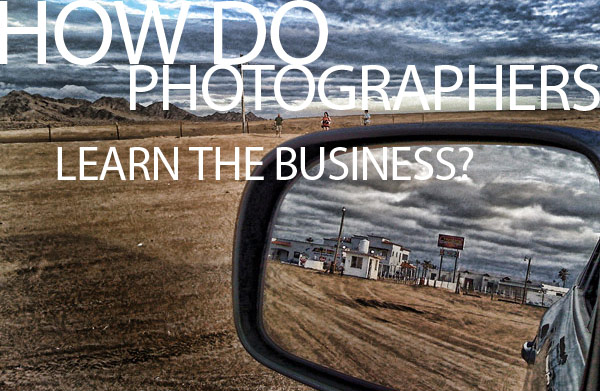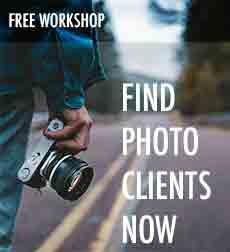
My friend Trudy posted a great little article with the question “How Do Photographers Learn the Business? I read it and asked Trudy if I could take a few of her questions and answer them here on my blog. Wednesday evening, September 1, we will have a show based on this post and other questions that Trudy raises… as well as your own.
If you missed the show, please enjoy the presentation here:
Please take a moment to read Trudy’s entire article and then come back here for my discussion of a few key points.
“Many photographers turn to older and/or more experienced photographers for help in understanding the business of photography. Many face insults, closed doors or guidance on everything except business.”
Sorry for the photographers that don’t help. I can’t speak for them, but I have always considered it both an honor and a responsibility to help startup photographers. The question I would ask is how they came to ask the established photographer? Was the shooter being asked the right one to ask? Was there research done to find out if the questions would be appropriate for that specific photographer? Was it a request for a favor or a demand… I get both. Requests do get answered, demands not so much.
I have also had the occasional “hey, you are really busy, but can you take a few minutes and tell me how to be successful? Can you give specific things to do and review my portfolio and give me some advice on where to show the work and who would be interested in what I do and … …?”
Well, no. No I can’t.
No one can.
However, there are different associations established for the very real agenda of teaching the younger shooters how to survive, negotiate, and learn the business ups and downs. They are more than happy to have the opportunity to help a young shooter understand how not to undercut themselves and the industry, and be more professional in the industry.
The ASMP (American Society of Media Photographers) and the APA (Advertising Photographers of America) are two that I am familiar with for the commercial side of the business. The direct to consumer shooters have the PPA (Professional Photographers of America) The Phoenix chapter has monthly meetings in my town. At least half of the meetings I am aware of are business related.
From dealing with clients to marketing on a regional scope, these organizations offer guidance, mentors, bidding strategies, pricing guidelines, tax planning and more.
The truly sad thing is how low the attendance is. Workshops on business are not as much ‘fun’ as workshops on shooting ‘hafnekkidchicks’ and ‘fashun’. Sorry for the attitude, but it is what it is. I would love to be proved wrong.
“A great business person with average work will always do better than a poor business person with stellar work. And who makes the decision that the work is good enough to be a business? Other photographers?”
Nope. The market decides. The clients who see the work decide. Other photographers have no point of influence in the decision of who is worthy and who is not.
Seeking validation from Flickr, or Facebook is not as conducive to your career boost as getting validation from the industry itself. Once the industry acknowledges you, there will be less problems with the validation from other photographers.
If you are getting work, you are a photographer. If you are growing and challenging yourself, you are a photographer. If you are trying things and failing once in a while (although, not on a gig) you are a photographer.
There seems to be a lot of angst on the interwebs about the terminology of ‘professional photographer’ and what that means. I think it means nearly nothing… you can be a weekend warrior and behave and act far more ‘professional’ than some full time photographers I know. Legally… you make money, you are a professional. I am simply not that into ‘terminology’.
“The truth is there is a certain point where every photographer (who wants to be more than a hobbyist) feels they are of the level to move their passion towards passion and profession.”
Yes, but “feeling” and knowing are two separate things. “Feeling” is subjective – “Knowing” is objective. And it takes a lot of work and self exploration to become educated. It takes asking questions that have uncomfortable answers. It is facing the fact that there is more to do, and then doing it, that makes the difference – and becomes the challenge.
Feelings cannot be measured, or confirmed. ‘Feeling’ that I am ready can be a truth or a delusion… it hasn’t been challenged, proofed, measured or controlled… it is an emotional decision that may be a totally different reality.
Knowing means I have measured, challenged, compared, contrasted, done the research, and found some (not all, but some) solutions and wins. I take that knowledge and filter it through what I already know about myself and the business. Then I KNOW what I can and cannot do… at that particular moment in time. Growth is easier when we know where to grow.
Way too many people make decisions based on what they ‘feel’ and that can be a terrible mistake.
“We can argue that some photographers aren’t “good enough” to be making money or to be successful, but the truth is business is about business. And if this business was one where only the most talented with the best images were the most successful, the need for the personal brand might be a completely mute one.”
Well, probably.
Maybe.
There is simply a lot of great work out there. There are more wonderfully talented photographers than there has ever been. They are everywhere. Many of them are part-timers, weekend warriors and such. Some of them are making great money and have a real part-time business.
And there are many many talented photographers who rock photographically but who aren’t making a single penny. And that is generally because they are not good at the other parts of this multi-faceted crazy business. They believe the work should speak for itself. And they are wrong.
But the really interesting group are the ones who are not terribly great, in fact, not good at all. And making money. Lots of money. They are the ones that are marketing harder, making more buzz than the other shooters. They do all the crap that no one wants to do. They shoot the little jobs and turn them into big jobs. They ‘sell’ whenever they are in a group of people. They can be obnoxious, grating and boorish.
But they are remembered.
Personal brand may be that deciding factor… if all else is considered the same. I think it is one of the most important assets a photographer can have. It can open doors, catch the eye, find more access, and define the work when one is not available. One of the most powerful tools – and one of the least understood.
“So a business degree helps, but isn’t the total answer. Even traditional education in other areas help, but isn’t the total answer.”
No, but then there is no total answer. Looking for one is frustrating and full of dead ends.
Photography is a business built on an art that can be at different levels of value. We tend to throw it all in the pot of “photography” and that pot actually doesn’t exist as a single receptacle.
There are levels and genres and demographics and perceived value and the ability of the photographer to control that perception.
And throwing in all the different regions, neighborhoods, levels of income, regional differences and personalities.
There can be no ‘one-size-fits-all’ answer to marketing. There are so many personal challenges that can get in the way.
I know one photographer who does 30 cold calls a week – another who has NEVER done a cold call, but sends out direct mail like crazy. There is nothing similar in their approaches, but both are keeping head above water in tough markets. Actually doing a bit better than head above water.
I have worked with a lot of photographers, and nearly every one who was in ‘trouble’ had issues that went beyond the images. They wouldn’t market with consistency. They had poor social skills, or egos that were not quite in line with the talent they believed they had. Some would proclaim there was no time, but they had no gigs… soooo, how does that work? And others were in the ‘blame game’ mode of believing there was some great conspiracy that had been in play to keep them from getting the work they deserved.
There isn’t a conspiracy, and there is no silver bullet. As well, there is no answer other than to keep looking for the authentic ways that make you stand out.
Yes, I know it sounds too simplistic… and hard, but it is simply such a personal thing to work on.
My friend Selina works with photographers one on one. She has her ways of drawing out the best in a photographer. There are many good personal coaches, consultants and photographers groups that can help a shooter develop a style and a marketing plan that makes sense.
“So how do photographers learn the business, which for the most part involves the four components of: sales, marketing, communication and management? From what I have observed and experienced it involves various cycles of learning, trial, error, failure, reinvention, success, complacency, stagnation, failure, learning, trial, error, reinvention, success.”
Well, that is true to a point. It can be terribly frustrating if there is no plan. And the plan has to make sense for the photographer. And that is tricky too.
But there are paths that have been carved into the marketing landscape. There are methods that work. There are ways to create buzz that are defined – at least with a soft edge of definition. It takes the individual to add the clarity. Others have had similar challenges and met them with success. So it can be done.
The challenges of the market, the perceived ‘anyone-can-do-it’ syndrome, and the reality of a very tight economy are some of the most formidable of recent memory. It will take a sustained effort and very focused personal attention to create a value that people want to spend their hard earned money on.
And that is the million dollar proposition. If I had the answer to it all, I would certainly share it with everyone. But I don’t… no one does. I believe there are ways to go, things to try, methods for testing, and people to ‘model’ for success.
It isn’t sexy, it isn’t easy, and it isn’t guaranteed. But it can be done.
 |
 |
 |
One final point: Expectations.
To be a hair cutter in this state costs between $4K and $10K. Learning refrigeration repair, auto repair, computer repair, and other trades can cost $8K – $12K. Becoming a dental assistant, or para legal can cost about $12K – $15K. And all of them produce a competent professional who will be looking at a mid or maybe higher mid 5 figure salary.
Photographers can easily be in the mid to high 5 figure salary range, but most photographers I know balk at spending any money on training or consulting or coaching. There is no end to the money they want to spend on lenses and strobes, but going to a weekend “Learning how to Market” workshop for $500 is considered outrageous on the forums and the boards… “you can learn that on your own…” – “that is just someone wanting to get rich off of your laziness…”
Sure. Whatever. I have two friends who are professional photographer coaches. With track records. With serious credentials. Their fees are not even a quarter that to learn how to cut hair… and photographers balk at the costs. They want it all, now, and without any pain or cost.
And life… she no worka thata way… (thanks, Grandma – you were right.)
Thanks so much for coming along on this fun discussion. I hope you visit Trudy’s excellent blog – and say hi. And special thanks for Trudy for allowing me to take some of her points and fleshing them out a bit.
______________
I am terribly sorry to have just learned that the “Share/Save” thing on my site is actually screwed up. Therefor, I will be adding this to the bottom of each post. It is a place for you to share the stories you read here easier… and sign up for the RSS feed.
For more information on our Learn to Light workshops and to follow me on twitter, just click the links I just provided. And, if you see this post in its full length on any other site, please let me know. Quoting and linking back is fine… sucking the whole thing into another site is not.






Since Trudy mentioned ‘stellar work’ as not necessarily being a success factor… I wonder if we sometimes hurt ourselves by overemphasizing this…? Of course we all want to grow and improve, but that’s not necessarily what the customer wants — the customer’s idea of ‘stellar’ is what has utility for meeting his/her needs. I spent six-and-half hours today shooting images of a corporate fitness program, none of which I’d want to show another photographer for fear of boring him/her to death… but my (internal) customer was delighted with them, because they were exactly what she needed and they were done by her deadline.
I’m so old that I remember when Ronald Reagan was first elected President, and once during the ‘honeymoon’ before his inauguration, some reporters were chatting with him about his movie career. One, no doubt thinking he was being very cheeky, said, ‘Uh, Mr. President, a lot of those movies weren’t very good.’
To which Reagan imperturbably replied: ‘Well, they didn’t want them good… they wanted them Wednesday.’
As photographers we want both, but how? That seems to be the juggling act that’s hard to master.
I don’t think we hurt ourselves by reaching for something better, for challenging ourselves to be better than we are. I can’t imagine waking one morning and saying… “Ah, what the hell… that is as good as it is ever gonna get. I have reached mediocre, that is fine with me. My clients will not be able to tell the difference anyway.”
For a long time, the work I did was simply work-a-day work that ended up on brochures and trade ads and collateral and annual reports. And we put that stuff in the book… back then. Not today. That work is expected, the creative is wanted (even if they end up giving you the mundane work to shoot, it took the creative to get in the door).
There has to be a balance… and the reality of the new media allows one to show the creative, while the workaday can be separated out for a specific showing.
In the end, it is the photographer providing appropriate photographs to their client. From ADDY winners to sidewalk banners in a small town… it is real and it is appropriate.
Thank you for taking the time to even consider my and other photographers’ concerns this way. I’m grateful.
You made great points that I’m thinking about and have thought about in the past.
I definitely agree on not seeking “validation†that way. Many photogs do seek guidance in the form of mentorship and some who don’t truly care to mentor release bad advice instead. So all photographers have to be careful as to what messages they let in.
“It isn’t sexy, it isn’t easy, and it isn’t guaranteed. But it can be done.†That sums it up. I do believe it’s possible, so that’s why constant improvement in all aspects is my passion. Most photogs are terrified to talk biz so I am glad you aren’t.
Again, thanks for the info/clarification. Awesome.
You mention that the average photographer looks at a $500 marketing class as ridiculous, yet has no trouble spending that much on a lens or a strobe. I think the core of that issue, at least for myself, is that I know what I’m getting when I buy a product. It’s a lot harder to put money down on a service or a class, as you don’t know exactly what you’re going to get out of it.
That being said, there have been several free ‘business of photography’ workshops I have attended, each of which proved invaluable, and afterwards made me wish I *could* have given them money. In the case of a business workshop put on by Photoshelter in conjunction with a local camera shop, I did give them money afterwards in the form of buying their services for the backend of my website and client delivery services.
It sounds like excuses and rationalization, and it probably is, but it’s how I see it I guess. The terrible part is that when you’re starting a new business is when you *need* the help from a marketing workshop the most, but it is also when you have the least capital to invest in things that don’t give you immediate, quantifiable benefits.
That’s why I’m glad there are websites like yours which are willing to go beyond lighting tutorials and camera settings, and actually talk business. Thank you, and I look forward to your webcast later today.
“It’s a lot harder to put money down on a service or a class, as you don’t know exactly what you’re going to get out of it.”
Yes. I know that all too well.
It seems that there are a lot of charlatans and folks who are better salesmen than teachers out there. Finding out information on who to go to is much harder than finding information on lenses and flash cards. And with an education system, you can only take in what you allow yourself to take in.
So both the teacher and the student must be actively engaged. That makes for non-guaranteed interaction and results. When you buy a lens, you put it on and it works. When you are working at something as difficult to measure as education or coaching it does throw a variable into the equation.
Research and tenacity is the answer… and an unbending desire to learn.
— don
I stumbled onto your website and caught a few minutes of your seminar tonight. What a great resource your blog is!! I can tell I will be spending a lot of time here in the next few weeks. Thanks so much.
— Angela
Do you know what I love most about your blog posts, Don?
They make me think.
“Thank you” to you and Trudy.
Thanks for the great post. It’s never an easy decision to put everything else aside and go for photography 100%. Like you say, the key is to keep working, keep shooting, keep marketing yourself.
Cheers,
GuessTheLighting.com